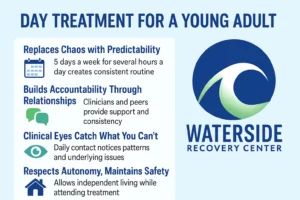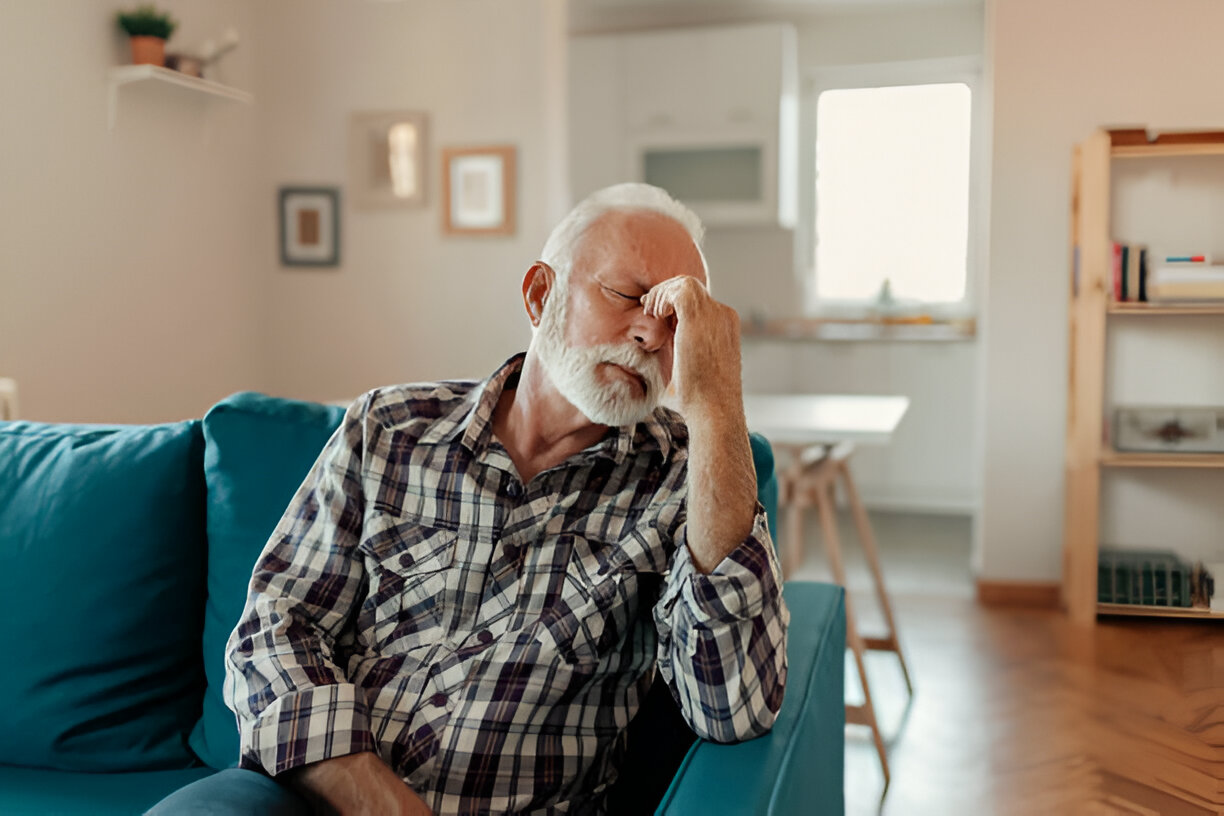You’ve been watching the signs—again.
The shift in your child’s eyes when they say they’re “fine.” The missed calls. The late mornings and restless nights. The feeling in your gut you hoped you wouldn’t feel again: they’re slipping.
And maybe they are. Not in a dramatic, rock-bottom way. But in the quiet, slippery way that often precedes something worse.
As a parent of a young adult struggling with substance use, you’re stuck in a painful paradox. You want to help—but without enabling. You want to guide—but without taking over. You want to believe they can recover—but also can’t ignore the pattern.
You may be wondering: What kind of support exists when residential treatment feels too intense, but doing nothing feels too risky?
That’s where a day treatment program comes in. It provides daily structure, clinical care, and emotional accountability—without removing your child from their life or stripping them of independence.
Let’s walk through how it works, and how it might help both of you exhale for the first time in a while.
It Replaces Chaos with Predictability
Young adults using substances often lose their grasp on time. They sleep late. Cancel plans. Drift between jobs or classes—or abandon them entirely. The loss of structure feeds the spiral.
A day treatment program offers something deceptively simple: a place to be, every day.
Programs typically run 5 days a week, several hours a day. That routine becomes the new anchor in a life that’s lost its rhythm. It offers just enough structure to create momentum, but not so much that it overwhelms.
Consistency becomes the quiet medicine:
- Wake up
- Show up
- Participate
- Rest
- Repeat
And when life has felt out of control, that kind of steady rhythm can feel like oxygen.
It Builds Accountability Through Relationships—Not Rules
It’s easy to think of accountability as discipline. But young adults don’t respond well to lectures or punishments—especially when they’re already flooded with shame.
In day treatment, accountability happens through connection.
They begin to build trust with clinicians, group members, and peers who see them clearly and consistently. When someone notices they’ve missed two groups in a row, it’s not a punishment—it’s a conversation.
Accountability here sounds like:
- “We missed you yesterday. Everything okay?”
- “You seemed closed off today. Want to talk about it tomorrow?”
- “You’ve been doing really well—how do you want to hold yourself to that?”
It’s subtle, but powerful. They learn to show up because someone expects them to—and eventually, because they expect it of themselves.

Clinical Eyes Catch What You Can’t
As a parent, you can see when something’s off—but you’re not trained to know whether it’s relapse, depression, trauma, or anxiety.
In a day treatment setting, your young adult is seen daily by licensed professionals. These clinicians don’t just lead therapy—they notice patterns:
- When a client is isolating
- When avoidance increases
- When regulation breaks down
- When progress plateaus
It’s not just about watching for relapse. It’s about noticing the why underneath the struggle—and addressing it before things escalate.
That kind of insight can feel like a lifeline for families walking blind in the dark.
Group Therapy Offers a Mirror, Not a Lecture
It’s one thing to hear hard truths from a parent. It’s another thing entirely to hear them from someone your age who’s been through it too.
That’s the gift of group therapy in a day treatment setting.
Clients are surrounded by others in similar life stages. That shared language, age, and energy creates a space where defenses soften. It’s not authority figures telling them what to do. It’s peers saying:
- “I felt like I was wasting my 20s too.”
- “I didn’t think this would help either—until I stayed.”
- “The first time I admitted I wasn’t okay was in this room.”
Sometimes the most powerful accountability doesn’t come from the program—it comes from the kid sitting next to them who says, “Me too.”
It Respects Autonomy Without Losing Safety
One of the hardest parts of early adulthood is that tipping point between freedom and risk. Too much restriction and they resist. Too much freedom and they spiral.
Day treatment lives in that middle space.
It allows young adults to live at home (or in their own space), while attending structured programming during the day. They’re not isolated. But they’re not unsupervised either.
That balance helps:
- Rebuild trust in the parent-child relationship
- Lower the stakes of treatment
- Ease resistance around “getting help”
It also gives you, the parent, a breather. You’re no longer the only container holding everything together. The program becomes a partner in care.
It Moves Them Toward Something—Not Just Away from Substance Use
The goal of day treatment isn’t just abstinence. It’s purpose.
Many programs, including Waterside Recovery’s day treatment program in Plymouth County, MA, incorporate:
- Life skills training
- Academic and vocational coaching
- Emotional regulation work
- Relapse prevention planning
Young adults begin to imagine futures again. Not just substance-free—but meaningful. That shift from survival to intention is where long-term change really starts.
You’re not just pulling them out of the water. You’re giving them a boat.
What You Can Do as a Parent—Even If They’re Hesitant
Your child may not jump at the idea of treatment. That’s normal. But you still have power—quiet, steady power.
Here’s what helps:
- Plant the seed: Mention the option casually but clearly.
- Speak to their goals: Frame treatment as a step toward something (school, work, independence), not just a fix for a problem.
- Invite curiosity: Ask if they’d be open to talking to someone from the program—not committing, just exploring.
- Respect their pace: Sometimes the first “no” becomes a “maybe” after one more sleepless night or a conversation with a peer.
You’re not trying to push. You’re leaving the door open. And that door matters more than you think.
Considering Options Near You?
If you’re looking for a day treatment program in Bristol County, MA or anywhere in the South Shore area, Waterside Recovery is here to help.
Our programs are designed specifically for young adults and their families—because recovery looks different at this stage of life. The stakes are high, but so is the potential.
FAQs: Day Treatment for Young Adults
What exactly is a day treatment program?
Day treatment (also called Partial Hospitalization or PHP) is a structured outpatient program where clients receive therapy, support groups, and clinical care during the day but return home at night. It’s often a step down from residential care or a step up from traditional outpatient therapy.
How long does it usually last?
Programs vary, but most day treatment programs run for several weeks to a few months, depending on the individual’s needs and progress.
What kind of therapy is included?
Treatment typically includes individual therapy, group therapy, psychiatric support (if needed), family sessions, and skills-based groups (like emotion regulation, communication, or relapse prevention).
Is it covered by insurance?
Often, yes. Waterside Recovery accepts most major insurance plans and can verify benefits before admission. We’re happy to help you understand your options.
What if my child is resistant to going?
That’s very common. Our admissions team is trained to engage young adults gently and respectfully. Sometimes, a simple conversation with a clinician can open a door.
Will I be involved in their treatment?
Yes. Family involvement is an essential part of our care model. We’ll work with you on communication, boundaries, and support—so you’re not navigating this alone.
Still searching for a next step that feels right?
Call (866)671-8620 or visit Day Treatment Program in Plymouth County, MA to learn more. We’re here to support your child—and you—through what comes next.


